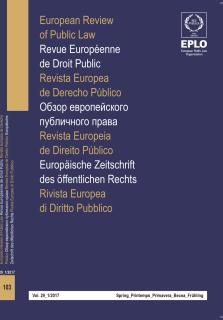
From Sovereignty to Post-Sovereignty and Back:
Some Reflections on Immigration and Citizenship Issues
in the Perspective of Refugee ‘Crisis’
Associate Professor, Union University Law School Belgrade; email: tatjana.papic@pravnifakultet.rs
This paper traces the implications of the territorial sovereignty principle raised by some EU Member States in response to the current refugee ‘crisis’ in Europe. It demonstrates that, despite the fact that the contemporary world is based on the post-sovereign states, whose traditional sovereignty is restricted by international and transnational norms, in the present ‘crisis’ the argument of territorial sovereignty served some states to restore both - the state’s power to decide who can enter its territory and who can claim membership in its political community. The authors argue that if exclusionary approaches to migrations seen exclusively through the lenses of the core sovereign prerogative continue to prevail over international and transnational law, it would not only abandon refugees, but also the further building of an ‘ever closer union among the peoples of Europe’.
Cette étude traite des implications du principe de souveraineté territoriale soulevées par certains Etats membres de l’UE en réponse à la “crise” actuelle des réfugiés en Europe. Elle montre qu’en dépit du fait que le monde contemporain est fondé sur les Etats post-souverains, dont la souveraineté traditionnelle est limitée par des normes internationales et transnationales, dans la présente “crise”, l’argument de la souveraineté territoriale a servi à certains Etats pour restaurer le pouvoir de l’Etat de décider à la fois qui peut entrer sur son territoire et qui peut réclamer de faire partie de sa communauté politique. Les auteurs soutiennent que si les approches exclusives des migrations vues uniquement à travers le prisme d’une prérogative de souveraineté fondamentale continuent de prévaloir sur le droit international et transnational, cela reviendra à abandonner non seulement les réfugiés, mais aussi le renforcement d’une “union sans cesse plus étroite entre les peuples européens”.
* Violeta Beširević wrote parts of this chapter within the project ‘Advancing Serbia’s Competitiveness in the Process of EU Accession’, no. 47028, financed by the Serbian Ministry of Education, Science and Technological Development.





















